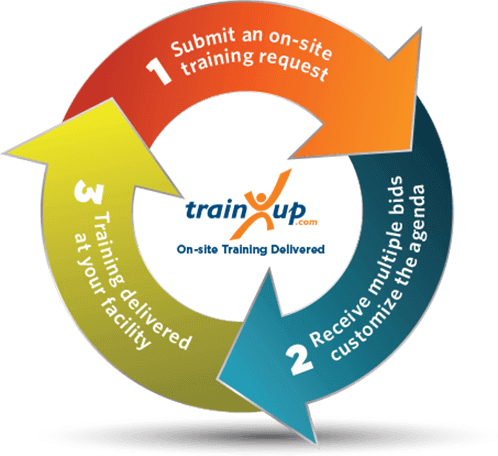
Compensation and Benefits Training Your Way
-
Custom In-Person/Group
Compensation and Benefits Training Delivered Virtually or On-Site
-
Virtual Live / Remote
Compensation and Benefits Training Classes
-
Self-Paced Online
Compensation and Benefits Training You Can Take Right Now
-
Customized eLearning
Your Own Compensation and Benefits Training Material
Or Choose From 24 Human Resources Sub-Categories
- ADA-Disabilities Training
- Affirmative Action - EEO Training
- Cafeteria Plan Training
- COBRA Training
- Compensation and Benefits Training
- Diversity Training
- FLSA Training
- FMLA Training
- HIPAA Training
- HR Compliance Training
- HR Generalist Training
- HR Internal Investigations Training
- HR Management Training
- Labor Law Training
- OSHA Training
- Payroll Training
- Personnel Law Training
- PHR - SPHR Training
- Recruiting - Hiring Training
- Sexual Harassment Training
- State Regulations Training
- Work and Life Training
- Workers' Compensation Training
- Workplace Health and Safety Training
Compensation and Benefits Training, Comp Benefits Courses and Seminars
TrainUp.com is your one-stop source for the best virtual compensation and benefits training and live courses nationwide. Start your search now and browse among 4 live instructor-led compensation and benefits training classes near you, from the industry's best compensation and benefits training companies such as Lorman Education, HRcertification.com, and Business & Legal Reports, Inc. (BLR) TrainUp.com also lists more than 40 self-paced online compensation and benefits training courses, micro-learning videos, and eLearning bundles. If you have a team to train, we can conduct a course just for you. Check out our onsite on-site compensation and benefits training page to request a custom virtual or in-person training quote today.
Request Compensation and Benefits On-Site Training. We bring the best instructors to you.
TrainUp.com is your one-stop source for the best virtual compensation and benefits training and live courses nationwide. Start your search now and browse among 4 live instructor-led compensation and benefits training classes near you, from the industry's best compensation and benefits training companies such as Lorman Education, HRcertification.com, and Business & Legal Reports, Inc. (BLR) TrainUp.com also lists more than 40 self-paced online compensation and benefits training courses, micro-learning videos, and eLearning bundles. If you have a team to train, we can conduct a course just for you. Check out our onsite on-site compensation and benefits training page to request a custom virtual or in-person training quote today.
Live Training
(0 Classes)
Self-Paced Courses
(51 eLearning Courses)
& Video Collections
(3 Bundles)
Up to 37% off Training
Looking for Live Training courses?
Please call us at 1-866-540-9677.
Workers' Compensation Fundamentals
Unique Workers' Compensation Aspects of Independent Contractors and Traveling Employees
The Relationship Between Social Security, Medicare, and Workers' Compensation Claims
Integrating FMLA, ADA, COBRA, And Workers' Compensation Training & Certification Program
Payroll Compensation & Taxation Training & Certification Program
Compensation Training & Certification Program
Sales Compensation Plan Design
Fundamentals of Physician Compensation
The Life Cycle of a Worker's Compensation Claim
Section 457(f): Compensation Guide for Nonprofits
Workers' Compensation Code Misclassifications: How to Avoid Overpayments
Employment Law Compliance: Disciplining or Terminating a Workers' Compensation Claimant
Understanding HR: Compensation
Avoiding Reinjuries in Workers' Compensation Claimants
Workers' Compensation Settlements
Running an Effective and Ethical Workers' Compensation Program
Adventures in Workers' Compensation
Contested Workers' Compensation Claims
Developing Safety Incentive Programs to Reduce Workers' Compensation Claims
Uncovering Workers' Compensation Fraud
Using Statistics in Compensation
Workers' Compensation - A Cost Savings Approach
Overview of Workers' Compensation Rate Calculations
Workers' Compensation Medicare Set-Aside
Best Practices in ADA, FMLA, and Workers' Compensation
Compensation and Benefits (HRCI: PHR/SPHR-aligned)
Compensation and Benefits (HRCI: PHR/SPHR)
Compensation and Benefits (HRCI: PHR/SPHR)

Get Up to 20% off Live & Online Training Courses

We’ll Conduct The Course Just For Your Team

Get Up to 20% off eLearning
SCORM /AICC compliant. Upload content to your LMS
We’ll help customize your curriculum. Send us a request today to preview our entire online training catalog

Customized eLearning Solutions
ILT /Virtual Live to eLearning MicroLearning Video Development Mobile Learning Gamified Learning Flash to HTML5 Conversion
TrainUp.com is your one-stop source for the best virtual compensation and benefits training and live courses nationwide. Start your search now and browse among 4 live instructor-led compensation and benefits training classes near you, from the industry's best compensation and benefits training companies such as Lorman Education, HRcertification.com, and Business & Legal Reports, Inc. (BLR) TrainUp.com also lists more than 40 self-paced online compensation and benefits training courses, micro-learning videos, and eLearning bundles. If you have a team to train, we can conduct a course just for you. Check out our onsite on-site compensation and benefits training page to request a custom virtual or in-person training quote today.

Request Compensation and Benefits On-Site Training. We bring the best instructors to you.
Comp Benefits Courses and Workshops
Compensation is about creating effective systems for human resources to follow by understanding the framework for establishing and maintaining an organization's pay system. Compensation must ensure fair and equitable pay for employees based on regulatory compliance standards. In addition, employee benefits managers and specialists handle the organization's employee benefits program, health insurance and pension plans. Compensation plans are designed to be administered as a compensation and benefits program and benefit plans are complex. In addition to health insurance and pension coverage, compensation plans may include life and death insurance, disability insurance, employee assistance, wellness programs, and flexible benefits plans. Compensation and benefits employees are regulated by federal and state rules to directly impact the lives of employees and their families.
Related Compensation and Benefits Training
- Compensation and Benefits training in New York, NY
- Compensation and Benefits training in Los Angeles, CA
- Compensation and Benefits training in Chicago, IL
- Compensation and Benefits training in Houston, TX
- Compensation and Benefits training in Philadelphia, PA
- Compensation and Benefits training in Phoenix, AZ
- Compensation and Benefits training in San Antonio, TX
- Compensation and Benefits training in San Diego, CA
- Compensation and Benefits training in Dallas, TX
- Compensation and Benefits training in San Jose, CA
- Compensation and Benefits training in Indianapolis, IN
- Compensation and Benefits training in Jacksonville, FL
- Compensation and Benefits training in San Francisco, CA
- Compensation and Benefits training in Columbus, OH
- Compensation and Benefits training in Charlotte, NC
- Compensation and Benefits training in Detroit, MI
- Compensation and Benefits training in Seattle, WA
- Compensation and Benefits training in Denver, CO
- Compensation and Benefits training in Boston, MA
- Compensation and Benefits training in Oklahoma City, OK
- Compensation and Benefits training in Las Vegas, NV
- Compensation and Benefits training in Kansas City, MO
- Compensation and Benefits training in Atlanta, GA
- Compensation and Benefits training in Toronto, ON
- Compensation and Benefits training in Vancouver, BC
Compensation and benefits Analysts need at least a bachelor's degree for most positions, and some jobs require a master's degree. Work experience in a related field is also considered essential for a career in compensation and benefits. There are also various licenses and certifications available for Compensation and Benefits Analysts, such as the Certified Compensation Professional (CCP), and the Certified Benefits Professionals (CBP). These certifications are globally-recognized HR compensation certifications.
To become a Certified Compensation Professional, you will need to take and pass the Certified Compensation Professional (CCP) certification exams. The Certified Compensation Professional certificate requires candidates to pass a series of ten exams. Each exam consists of ninety multiple-choice questions. Each exam typically takes four hours to complete, therefore should be scheduled on different days.
The cost to obtain a Certified Compensation Professional designation (CCP) can vary from $5,000 to $15,000 for the total cost of the ten exams that are required to earn this certification. In addition to certification exams, you will need training to prepare for them and to help you pass the exams. TrainUp.com is your one-stop source for the best compensation and benefits training courses nationwide. The cost of training can vary from $69 to $399 per class depending on duration and course format.
According to CareerBuilder.com, a Benefits Specialist is typically paid an average salary of around $62,500 annually. However, Indeed.com reports that the average salary for a Benefit Specialist is $49,664 per year in the United States; based on 1,713 salaries submitted anonymously to Indeed by Benefit Specialist employees, users, and past job advertisements. Entry-level positions, of course, provide salaries below the national average, however, these salaries will grow based on experience.
To become a Benefits Specialist, you will likely need at least a bachelor's degree for most positions, and some jobs require a master's degree. Work experience in a related field is also considered essential for a career in benefits.You will then most likely want to become a Certified Employee Benefits Specialist (CEBS). The official Certified Employee Benefit Specialist program is a five-course program that covers everything you will need to know about employee benefits. Online study classes are available for Compensation and Benefits through Trainup.com and are designed for independent study.
Skills training provides employees with the specific skills needed to meet the requirements of their job roles. Skills training is also used to refresh employees or to update them when a new technology emerges. Skills training provides relevant skill sets and knowledge required for employees to perform their jobs.
The purpose of training is the same no matter what the content: to gain the knowledge, skills, and abilities required for effective job performance. Everyone can benefit from training, whether it is to learn new skills, for compliance, or to refresh your knowledge of a subject.
There are infinite benefits of training your employees. To list a few, you can expect training to increase job satisfaction and morale among your employees, and to increase your employee's overall motivation as well as their efficiency. Training employees how to harness their skills to do a job better often results in both employee empowerment and financial gain for your company. Training also gives employees the ability to adopt new technologies with confidence, keeping your company innovative and competitive.
Professional training is very important for your employees. Professional training increases job satisfaction and morale among your employees, and to increase your employee's overall motivation as well as their efficiency. Training employees how to harness their skills to do a job better often results in both employee empowerment and financial gain for your company. Training also gives employees the ability to adopt new technologies with confidence, keeping your company innovative and competitive.
Training is highly beneficial for your company overall. Training teaches your employees how to harness their skills to do a job better often results in both employee empowerment and financial gain for your company. Training also gives employees the ability to adopt new technologies with confidence, keeping your company innovative and competitive.
The main objective of training is to arm individuals with the knowledge, skills, and abilities required to be successful on the job, as well as to develop their interpersonal relationships within and outside of the workplace. Training increases a person's knowledge of a subject, as well as their tact and diplomacy, therefore increasing their value and success within an organization.
The aim of training is to help employees or individuals gain the knowledge, skills, and abilities required for effective job performance. Training increases your knowledge of a subject to increase your value and success in the workplace.
Join The 50,000+ Companies That Have Purchased Training from TrainUp.com
-
50K+ Companies Trained
Including 90% Of Fortune 500 Companies Have Purchased Training With TrainUp.com
-
300K+ Courses & Videos
Live Instructor-Led (Classroom & Virtual), Self-Paced E-learning & Custom OnSite Training Solutions From Leading Training Providers
-
800+ Expert Instructors
Industry-Leading Subject Matter Experts (SMEs).Tenured &
Award-Winning Instructor Network
Get the latest industry news, recommended courses, & promotions from TrainUp.com sent straight to your inbox.















